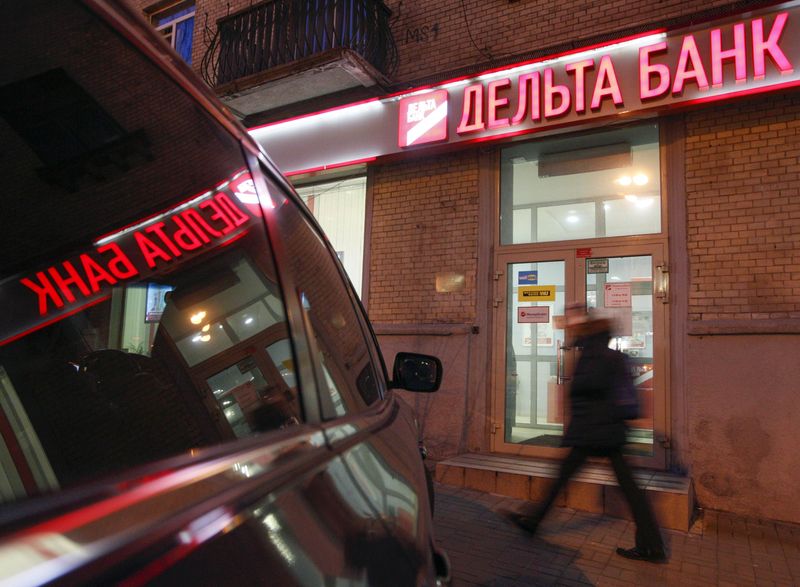By Natalia Zinets and Thomas Grove
KIEV (Reuters) - A month ago, Natalia Sorokun, 40, went to a downtown Kiev branch of Delta Bank to ask if the bank was solid enough to continue keeping her safe deposit box of valuables there.
Now, a day after Ukraine's central bank declared Ukraine's fourth largest bank insolvent, Sorokun and other Delta Bank customers could only knock on the bank's locked door in hope of finding out what happened to their savings.
After a year of political upheaval and war, Ukraine's economy is in tailspin with a currency that just pulled back from record lows, the highest interest rates in 15 years and fresh fears that insolvency could spread to other lenders.
"In our country, it's ridiculous to believe anyone or anything. We have no laws, and any promises they make can be broken at any moment," said Sorokun who said she closed her bank accounts a year ago at the beginning of street protests that ousted Moscow-backed president Viktor Yanukovich.
"The best thing is to avoid banks altogether, if you have money at all that is," said Sorokun, a speech pathologist.
Depositors of other banks that have already been shut have received compensation, and the state says it will continue to compensate deposits of up to 200,000 hryvnia at failed banks. But with the currency having lost a third of its value since the start of this year after halving last year, any delay could be costly.
At a Delta Bank branch in central Kiev, the lights were on but the door was locked. A note on a piece of paper over the ATM said: "out of service".
A Delta Bank spokeswoman said it was not clear when customers like Sorokun would be given access to their safe boxes. Sorokun's husband said the bank's call centre had told him it hoped to restore access within a week.
As part of its effort to halt the currency's slide, the central bank has also decided to raise its interest rate to 30 percent, the highest since 2000, drawing fury from businesses.
"(The bank) is halting the development of industry and small and medium-sized businesses, making lending to the real sector of the economy impossible and significantly reducing consumer demand," the Kiev-based union of industrialists and entrepreneurs said.
BANKS SHUT
The collapse in the currency and the wider economy has been devastating for the banking sector. Ukraine's central bank has already shut around 10 banks this in the first two months of this year after closing 33 last year, in all nearly a quarter of the pre-crisis total.
"(Delta) is hardly the only weak bank... Other bankruptcies may happen on the market," said Hlib Vyshlinsky, deputy managing director at GFK Ukraine, who said other banks are known for risky practices, such as lending to their shareholders.
Delta's main shareholder, Nikolai Lagun, said in a statement the lender needed an injection of more cash from the central bank, like the almost 5 billion hryvnia it was given last year, and blamed the bank's fate on the country's economic situation.
Kiev-based Credit Rating which monitors the health of 32 Ukrainian banks said that of them, eight were in deteriorating condition.
"The biggest risk is liquidity. Without that, the future work of these institutions will depend on reforming reserves and the financial strength of the banks' partners," said Olga Shubina, deputy general director of Credit Rating.
The government and central bank say the collapse in the hryvnia is driven by "irrational" demand for hard currency, which they believe will halt once Kiev's finances are repaired by the start of a $17.5 billion International Monetary Fund bailout, potentially within weeks.
The hike in interest rates is part of a package of steps Kiev has taken to drive the hryvnia back up to 20-22 to the dollar after it fell below 30 to the dollar last week. It was trading at 23.71 to the dollar on Wednesday based on the average of transactions registered by the central bank.
To keep up the value of the hyrvnia, exporters are obliged to sell 75 percent of their foreign currency earnings, while importers are required to obtain administrative approval before they are permitted to buy dollars.
Currency traders say the restrictions on buying dollars are keeping demand artificially low, reducing trade volume and pressure on the currency, but at a cost of damage to the wider economy as importers face more difficulty doing business.
"Activity is low because there are practically no buyers. The conditions for buying foreign currency, which the central bank put in place, are impossible to fulfil," said a bank trader, speaking on condition of anonymity required by the employer.

Earlier this week, the parliament passed a raft of IMF-backed amendments to the 2015 draft budget in hopes of pushing the deal with the international lender through.